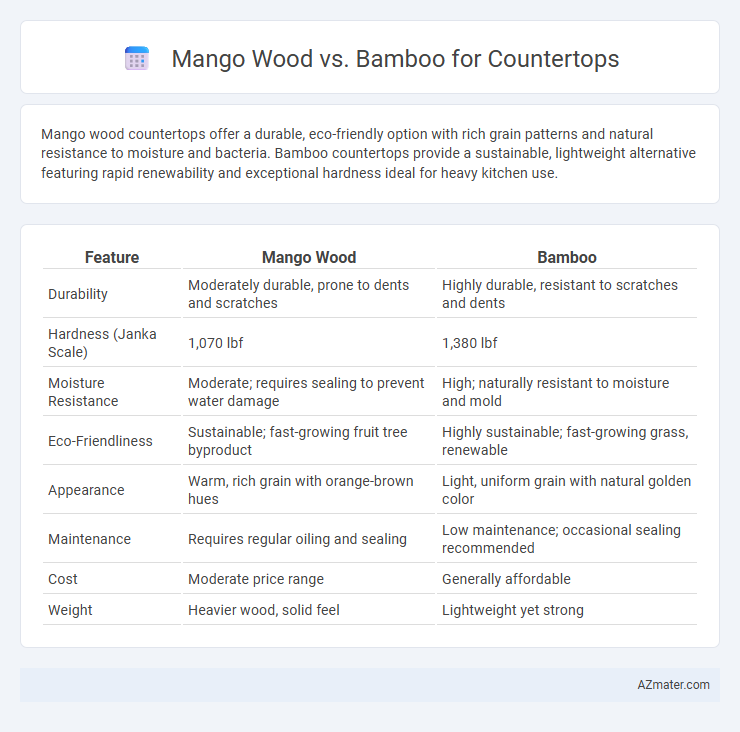Mango wood countertops offer a durable, eco-friendly option with rich grain patterns and natural resistance to moisture and bacteria. Bamboo countertops provide a sustainable, lightweight alternative featuring rapid renewability and exceptional hardness ideal for heavy kitchen use.
Table of Comparison
| Feature | Mango Wood | Bamboo |
|---|---|---|
| Durability | Moderately durable, prone to dents and scratches | Highly durable, resistant to scratches and dents |
| Hardness (Janka Scale) | 1,070 lbf | 1,380 lbf |
| Moisture Resistance | Moderate; requires sealing to prevent water damage | High; naturally resistant to moisture and mold |
| Eco-Friendliness | Sustainable; fast-growing fruit tree byproduct | Highly sustainable; fast-growing grass, renewable |
| Appearance | Warm, rich grain with orange-brown hues | Light, uniform grain with natural golden color |
| Maintenance | Requires regular oiling and sealing | Low maintenance; occasional sealing recommended |
| Cost | Moderate price range | Generally affordable |
| Weight | Heavier wood, solid feel | Lightweight yet strong |
Introduction to Mango Wood and Bamboo Countertops
Mango wood countertops offer a sustainable, dense hardwood option prized for its rich grains and durability, making it a popular choice in kitchen design. Bamboo countertops are engineered from fast-growing grass fibers, valued for their eco-friendliness, hardness, and resistance to moisture and bacteria. Both materials provide unique aesthetics and environmental benefits, catering to diverse preferences in durable and stylish kitchen surfaces.
Sustainability: Mango Wood vs Bamboo
Mango wood and bamboo are both sustainable choices for countertops, with mango wood sourced from fast-growing, fruit-bearing trees often harvested after fruit production declines, promoting resource efficiency. Bamboo, a rapidly renewable grass, can be harvested every 3-5 years without killing the plant, offering a highly renewable material with low environmental impact. Bamboo's fast growth and high carbon sequestration capacity generally make it more sustainable than mango wood in terms of resource regeneration and ecological footprint.
Durability and Hardness Comparison
Mango wood offers moderate hardness with a Janka rating of approximately 1,070, making it durable but susceptible to dents and scratches under heavy use. Bamboo, although technically a grass, boasts a higher hardness rating up to 1,380 on the Janka scale, providing superior resistance to wear and impact on countertops. For long-lasting durability, bamboo's dense, fibrous structure outperforms mango wood, maintaining its integrity in high-traffic kitchen environments.
Aesthetic Appeal: Grain, Color, and Style
Mango wood countertops showcase a rich, warm grain with varied golden to reddish-brown hues, adding a rustic yet elegant charm to kitchens. Bamboo countertops feature a smooth, uniform grain with light, creamy yellow tones, offering a sleek and modern aesthetic. The distinct patterns and colors of mango wood create a more traditional, textured look, while bamboo's consistent style suits contemporary and minimalist designs.
Maintenance and Care Requirements
Mango wood countertops require regular oiling with mineral oil or a food-safe wood conditioner to maintain their durability and resist moisture damage, while bamboo countertops benefit from consistent sealing and gentle cleaning to prevent cracking and warping. Both materials need to avoid prolonged exposure to standing water and harsh chemicals, but bamboo's natural hardness offers better resistance to scratches and dents compared to mango wood. For long-term maintenance, mango wood's porous surface demands more frequent conditioning, whereas bamboo countertops often require less intensive care but still benefit from periodic refinishing to preserve their smooth, moisture-resistant surface.
Cost Analysis: Mango Wood vs Bamboo
Mango wood countertops typically cost between $20 to $30 per square foot, making them moderately priced compared to other hardwoods, while bamboo countertops generally range from $25 to $45 per square foot, reflecting their eco-friendly appeal and durability. Mango wood offers a budget-friendly option with good strength and unique grain patterns, whereas bamboo, though slightly more expensive, provides superior hardness and resistance to moisture. Evaluating long-term maintenance and replacement costs, bamboo surfaces may prove more cost-effective due to their enhanced durability and resistance to wear.
Water and Stain Resistance
Mango wood offers moderate water resistance but requires regular sealing to prevent stains and moisture damage, making it less ideal for high-moisture areas. Bamboo exhibits superior water resistance due to its dense, fibrous structure and natural silica content, reducing the risk of staining and warping under frequent exposure to liquids. Both materials benefit from proper finishing, but bamboo generally provides better durability and maintenance ease for countertops in wet environments.
Eco-Friendliness and Environmental Impact
Mango wood countertops offer a sustainable option by repurposing wood from mango trees that no longer bear fruit, reducing waste and deforestation. Bamboo grows rapidly and requires minimal pesticides, making it a highly renewable resource with a smaller carbon footprint compared to traditional hardwoods. Both materials provide eco-friendly alternatives, but bamboo's faster growth rate and lower resource needs often make it a more environmentally efficient choice.
Installation and Workability
Mango wood offers excellent workability due to its smooth grain and moderate hardness, making it easy to cut, shape, and finish during countertop installation. Bamboo, being a denser and harder material, requires specialized tools and techniques to prevent splintering but provides superior durability and resistance to moisture. Both materials allow for straightforward installation with proper sealing, though mango wood generally allows for quicker modifications on-site compared to bamboo.
Final Verdict: Best Choice for Countertops
Mango wood offers superior durability and rich grain patterns, making it an ideal choice for countertops demanding strength and aesthetic appeal. Bamboo is highly sustainable and resistant to moisture, suitable for eco-friendly kitchens but may require frequent maintenance to prevent wear. For long-lasting performance combined with natural beauty, mango wood stands out as the best choice for countertops.

Infographic: Mango wood vs Bamboo for Countertop
 azmater.com
azmater.com